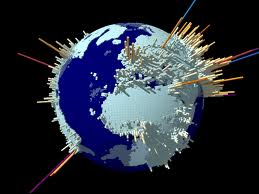Of Uncertain Futures
As We Are Not Yet One…
by Jan Lundberg
As the modern age accelerates its downward spiral toward an uncertain outcome, we are divided in our outlooks and fears. Â Yet, if we examine them, and if enough of us have a dialogue resulting in action, we might discover our apparent weaknesses in such a way to make us stronger.
 More “haves” than ever sense an uncertain future, mainly that of becoming have-nots. Â But when haves admit that deeper threats are getting close to engulfing humanity — ecological deterioration, famine over rising energy prices and water shortage — the future appears downright doubtful.
More “haves” than ever sense an uncertain future, mainly that of becoming have-nots. Â But when haves admit that deeper threats are getting close to engulfing humanity — ecological deterioration, famine over rising energy prices and water shortage — the future appears downright doubtful.
The have-nots have fears about the future too, but rarely about becoming haves. That was so ’60s. The uncertain future of non-rich, insecure people can appear to them to be limited to severe lack of money.  But knowledge of ecological collapse and resource shortages are also appreciated by many of the poor, thereby putting almost all people in the same boat (today or very soon).
Another future that is uncertain is actually a good one. People who know about it and are not attached so much to material possessions are already enjoying what they foresee as a sane future. Although upheaval and chaos seem unavoidable, the better future is not just a pipe dream.  It would be based on a renewed human spirit of cooperation, mutual aid, and community building. Call it the unified future.  So if it comes about, as we somehow withstand collapse of the old paradigm and the ravages of an angry Earth climate, then the unified future becomes not an uncertain future, among the several glimpsed today, but our common future.
Looking out for number one is history
As long as people can be individualistic consumers, they can buy their own way to a modicum of material comfort and freedom. Â But they are still slaves to an artificial world whereby work and obedience to regimentation stand in the way of free nature and enjoying her gifts. Â Beautiful subsistence, however, requires not only a fair social structure but a benign climate. It can be achieved through radical ecological restoration featuring CO2 sequestration via massive tree planting combined with permaculture — assuming that fossil fuel foolery ends soon enough.
Economic growth or just the idea of it is a favored drug that opens up a vast but false material world. Like any high, it does not work infinitely. Â The end of growth may be about now, as indicated by the rapid depletion of cheap, abundant oil. The elementary fact that oil is the irreplaceable ingredient of our oil-based infrastructure is tossed aside by technotopians hoping for a seamless transition to greener growth — a very uncertain future.
For anyone to advocate for yesterday’s economic growth, while knowing what extractive industries and pollution have done to our natural life support system, is insane. Â And it is ignorant or deliberately misleading to predict a return to sustained economic growth when the realities of energy resources are understood and honestly considered.
At seven billion people, the Earth has well overshot natural carrying capacity, with the aid of fossil fuels. Teetering on a precipice and vulnerable to geopolitical events triggering petrocollapse, we are remarkably quiet about the fate of billions. In part this is because of the drum beat of population-growth expectations designed to calm the uneasy herd: we are supposed to anticipate 9 to 11 billion people. This is even acceptable to environmentalists leaning toward magical thinking, as they hope vegetarianism can accommodate our numbers and avoid unpleasant collapse. Even if this were feasible, other species crowded out mean the web of life is further shredded.
But it is not insane to advocate a kind of economic growth, that of higher quality local economics.  This has gotten more popular, despite corporate media and government propaganda supporting the corporate global economy. If the tendency to redefine quality of life — alive and well here and there, although not uttered by the politicians and major news outlets — grows and we reach consensus, we have all but guaranteed a sustainable, livable future.  It depends on your being or becoming active for the collective good, today.
Jan Lundberg is the founder of Culture Change, and was an oil industry analyst at Lundberg Survey before joining the grassroots environmental movement in 1988. This article originally appeared on Culture Change.
